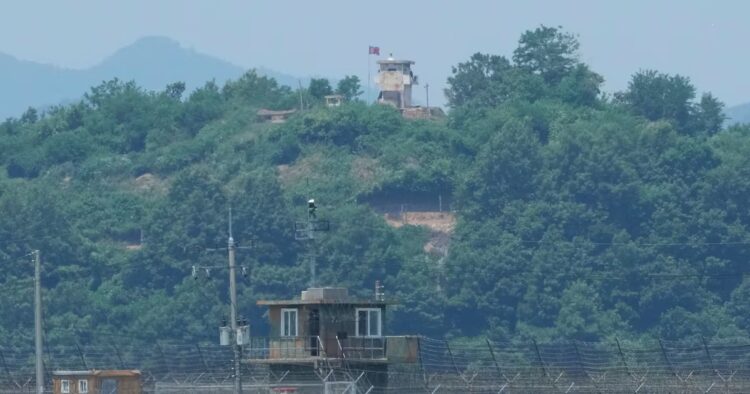In a recent incident along the Korean border, tensions escalated as South Korea’s military fired warning shots, prompting North Korean troops to retreat. This marks the third intrusion by Pyongyang soldiers into South Korean territory this month.
The confrontation occurred when North Korean troops crossed the military demarcation line to undertake unspecified construction work on their side of the border. Seoul’s Joint Chief of Staff clarified that previous intrusions were not considered intentional as North Korean soldiers withdrew after the warning shots without retaliating.
Since April, South Korea has been closely monitoring rapid construction activities by North Korean troops, which include suspected anti-tank barriers, road reinforcements, and planting of land mines. These developments have heightened concerns and increased military vigilance in the region.
Beyond military maneuvers, tensions were exacerbated when South Korean activists launched large balloons carrying anti-North Korean leaflets toward North Korea. Led by North Korean defector Park Sang-Hak, the group floated balloons containing 300,000 propaganda leaflets, 5,000 USB sticks with South Korean pop songs and TV dramas, and 3,000 US dollar bills from the town of Paju.
This action has revived memories of the Cold War era confrontations that have historically strained relations between the two nations.
Responding to previous leafleting campaigns, North Korea retaliated by launching over 1,000 balloons into South Korea, which caused damage to roofs and windows by dropping tons of trash. These tit-for-tat actions underscore the volatile nature of relations between North and South Korea, which have been strained for decades.
ALSO READ: “Putin Warns South Korea: Arms Deliveries to Ukraine Will Have Consequences”
Geopolitical Context and Regional Concerns
The recent incidents come amid heightened geopolitical tensions in the region, fueled by North Korean leader Kim Jong-un’s advancements in nuclear weapons and missile programs. Analysts suggest that Kim Jong-un’s actions are aimed at bolstering his regional influence, particularly amidst geopolitical alignments that include closer ties with Russian President Vladimir Putin against the US-led Western powers.
The situation at the Korean border remains tense, with both sides closely monitoring each other’s actions. The international community continues to watch developments closely, hoping for a de-escalation of tensions and renewed efforts towards peace and stability on the Korean Peninsula.

















Comments